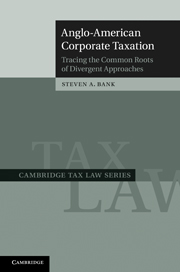6 - Politics
from Part II - Explaining the divergence
Published online by Cambridge University Press: 07 October 2011
Summary
The previous chapters have discussed the influence of profits and power in the development of the corporate income tax in the United Kingdom and the United States, but those explanations cannot possibly tell the whole story. After all, the British corporate tax system, in particular, underwent radical changes during the twentieth century, from an integrated approach to a classical approach and back again in less than a decade, while changes in dividend policy and corporate power have been much more gradual and less volatile over the same time period. The missing ingredient is the effect of politics on the approach to corporate taxation.
Because of structural differences between the legislative process in the USA and the UK, one might expect that politics would be less of a factor in the latter than the former. In the UK, the tax policymaking process has been described as “closed” or shrouded in “secrecy, with a strong emphasis on the exclusion of interest groups.” Tax measures are decided by British officials and voted upon in Parliament, with little room offered for amendment. John Tiley observed that “[o]pposition parties can propose amendments, and sensible (such as technically helpful and zero-cost) ones will often be adopted by the government, but only on the basis that it does the drafting.” As a result, Michael Keen noted, tax provisions “are commonly announced in the annual Budget speech of the Chancellor of the Exchequer as, in effect, fait accompli.” By contrast, in the USA, while the President may propose tax measures on his own or as part of the administrative process, bills themselves originate in and are negotiated by the legislative branch, with special interest groups afforded generous access to politicians who vote on proposed legislation and their staffers who advise them how to vote on the legislation.
- Type
- Chapter
- Information
- Anglo-American Corporate TaxationTracing the Common Roots of Divergent Approaches, pp. 188 - 220Publisher: Cambridge University PressPrint publication year: 2011

